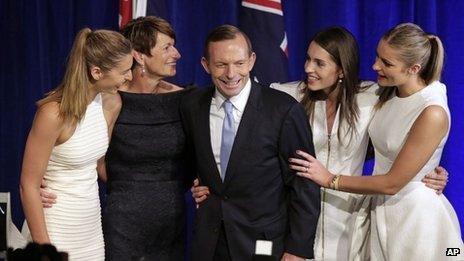Abbott's mostly male cabinet
- Published

Mr Abbott, centre, has been criticised for his attitude towards women
Tony Abbott has often faced criticism for his attitude towards women. That criticism has sometimes been emphatic, courtesy of former Prime Minister Julia Gillard, external. It has sometimes been merely embarrassed, courtesy of one of his own daughters, external.
Mr Abbott's new cabinet, unveiled on Monday, will do little to lessen the flak, but suggests the soon-to-be prime minister is not unduly concerned. Just one of the 19 cabinet members is a woman. Mr Abbott said he himself was disappointed with the situation, external. But as is pointed out here, external, not too disappointed to do anything about it.
The Labor Party (which had six women in its cabinet before it lost the election last week) was quick to try and capitalise. The acting leader Chris Bowen, external pointed out that Afghanistan now has more women (three) in its cabinet than Australia.
But in fact, in the past, Australia has had a relatively good record on gender equality in politics, as this piece by Meryl Kenny, external from the University of New South Wales just before this month's election points out.
As Kenny points out that is slipping, but even in this current Australian parliament, when all the votes are finally counted, 39 of the 150 members in the House of Representatives will be women. That's 26%. Far from equality, but take a look at this table, external compiled in February 2013 and you'll see it would rank Australia considerably ahead of both Britain (22.5%) and the United States (17.8%)in terms of female representation.
The issue has reopened a debate here about whether there should be gender quotas, external when selecting parliamentary candidates. The Labor Party, which of course had the country's first female prime minister in Julia Gillard, has had such a system in place since 1994.
Tony Abbott and his Liberal Party have firmly rejected quotas up to now, preferring selection "on merit". His first cabinet selection suggests that position is unlikely to change soon.